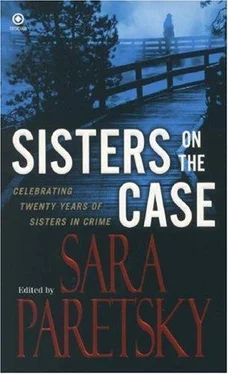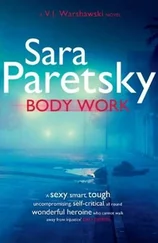Mary put up her first crop of tomatoes by the end of the week. Dennis kept the kitchen range at top heat under the copper boiler, and though Mary denied her need for the clock, just to be sure she set the alarm for each step. The sweat ran down both their faces, and when a great drop fell from the tip of Mary’s nose into a bowl of tomatoes she cackled, ‘‘Sure, they needed more salt.’’
In the evening they sat at the kitchen table where Mary marked labels ‘‘Mary’s Best’’ for the jars she would seal with a final turn before bedtime. Hope Valley Market would take all she could provide. Through the open window they could hear an occasional car go by and the singsong chatter of katydids, and closer overhead, the frantic buzz of an insect caught on the sticky tape that dangled from the light. Sometimes music wafted their way from Norah’s radio.
Dennis tilted back in his chair though she’d asked him not to do it. He sat upright suddenly and, pinching his nose, began to sing, ‘‘ ‘I’m just a vagabond lover…’ ’’
‘‘My God,’’ Mary said, ‘‘where did you learn that?’’
‘‘From the radio. Didn’t you ever hear Rudy Vallee?’’
‘‘I’d just as soon not,’’ Mary said. ‘‘Try it without the clothespin.’’
He grinned, cleared his throat, and sang it in his own voice. The voice of the child she remembered was gone, but there was a deep, sad music in what she heard.
‘‘Do you miss the city, Denny?’’
‘‘No.’’
‘‘Neither do I,’’ she said. It seemed many yesterdays since she’d come out from Chicago on the train with Donel Rossa to Norah’s chilly welcome.
Both sisters were alongside the road when the threshing combine on its way to Rossa’s came rattling through town and stopped for Denny. Men aboard the last rig gave him a hand up, and all of them waved at Norah and Mary, who watched until the blinding sunrise washed them out of sight. Children, up at dawn to follow the caravan through town, went home to breakfast and the sisters turned into their own walkways. Mary resented Norah’s being there, but it was not in her heart to part without a word.
‘‘Will you have a cup of tea? The kettle’s on the back of the stove.’’
Norah would rather have gone home. More and more she felt the presence of Dennis to be everywhere in Mary’s house. She even avoided seeing the cot where he slept in the back kitchen. But what she said was, ‘‘Let me close the front door and I’ll be over.’’
‘‘Oh, for the love of God,’’ Mary said. Doors were anathema to her.
Norah pulled a chair out from the kitchen table.
‘‘I’m leery of that one,’’ Mary said from the stove. ‘‘I can’t break him of the habit of teetering on the back legs of a chair. You’d think they were rockers.’’
‘‘I won’t teeter,’’ Norah said. The chair creaked when she sat down. ‘‘And I won’t be staying more than a minute.’’
Mary brought the teapot and swirled the tea before she poured it. It was on the tip of her tongue to say This’ll put hair on your chest, but she held it back. She was trying to cure herself of saying the common things like it she had picked up God only knew from where.
Norah helped herself to sugar. Whatever milk Mary had was always on the turn in summer. She could have kept it in the well like the couple used to. ‘‘Did you want the old trunk in the storeroom badly, Mary? I could empty it out.’’
‘‘What would I be putting in it?’’
‘‘And what will you put in the cupboard when you get it over?’’
‘‘Won’t he be getting clothes one of these days and needing a place to hang them?’’
Norah was sure now she shouldn’t have come. She felt hurt, pushed out. She wanted to push back. ‘‘I’ve been going through the things I’ve kept in the trunk all these years-I was thinking I’d make a rag rug of them someday but I never did-her petticoats and his flannel shirts. The shirts would fit Denny, you know. I could shorten the sleeves for him.’’
Mary’s face shriveled up like an old woman’s and the spittle sprayed from her mouth before she could speak. ‘‘Keep his filthy shirts to yourself. They’re all yours. Do you think I’d let him put them on his back?’’
‘‘It was a long time ago, Mary.’’
‘‘If it was forever, would I forget it?’’
‘‘I know how you feel.’’
‘‘You know how I feel! There’s more feeling in this teapot than in you.’’
Norah struggled to get up. ‘‘I don’t have to take this from you, Mary. I could turn you out if I wanted and nobody’d say I did wrong. It wasn’t my fault he made a strumpet out of you. Didn’t you beg them to bring you over? ‘I’ll do anything that wants doing,’ you wrote. I read them your letters-she couldn’t read-and I remember him sitting there laughing to himself. ‘Isn’t she the lively one now?’ he’d say. He treated me like dirt from the day you arrived. The two of you making fun of me behind my back. I never told on you. I never complained to her, but she knew. She’d sit at the sewing machine and cry to herself.’’
At the mention of tears her own eyes filled, not at what she remembered, but at the feeling of emptiness building inside her. ‘‘I’m trying to help you if only you’d let me. I’ve tried ever since the day you came back. Even Father Conway says I could not have done more.’’
‘‘Nor cared less,’’ Mary said. ‘‘Will you go home out of here, Norah? You’re like a great, fat hen, scratching everything into your nest. Cluck, cluck, cluck. Can’t you leave him and me alone?’’
‘‘You think you own him body and soul,’’ Norah blurted out. ‘‘You’d hire him out to your bootlegger friend, but you wouldn’t let him wash a window in my house.’’
Mary put her hand up to shield her face. Norah looked about to strike her. And Norah had never wanted more to hit her across the mouth. But she pulled back and made her way toward the door. She stopped and looked round at a burst of laughter from Mary.
‘‘Oh, my God,’’ Mary shouted. ‘‘You’re in love with him!’’
Norah quick-smiled. ‘‘You can’t say that, Mary. Haven’t you always said, ‘Poor Norah. She can’t love anybody except herself’?’’
Rossa stopped for a word with Mary when he brought Denny back on his way into town. ‘‘I was wrong about him, Mary. He’s not all muscle. He’s got a brain up there. And get him to sing ‘Home on the Range’ for you.’’
‘‘Aren’t you the one,’’ Mary said, sparing herself having to thank him.
Christopher Columbus could not have had more to tell returning from America than Denny coming back from Donel Rossa’s farm.
‘‘Did you learn how to milk a cow?’’ Mary asked.
‘‘And how to squirt milk in the cat’s mouth,’’ Denny said.
Mary remembered learning to milk and the kick of the cow who didn’t think much of how she went about it, and she thought of Norah’s going on about how she had begged to be brought over. She’d known when she landed she’d never go back. In steerage, sick as a dog all the way.
And him threatening to send her back if she didn’t give in to him. ‘‘Lie down on the bale there and turn up your arse.’’ She’d never got over it, even with Michael. And Norah saying, ‘‘I know how you feel.’’ Norah had gone home and pulled down the blinds on the windows that faced the barn. When she came out of the house it was by the front door and she never looked across. Nor had she hung a stitch on the clothesline.
‘‘I didn’t get to do much milking,’’ Denny said. ‘‘It’s terrible hard on the wrists, you know.’’
‘‘Is it now? Would you teach your granny to milk ducks?’’
Читать дальше












